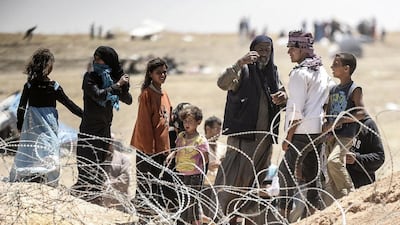With 14.4 million residents, Istanbul, the Bosphorus-straddling alpha city with a feet in two continents, Asia and Europe, is now the fifth most populous city in the world. Last year, Forbes, the list-loving business magazine, ranked it the world's seventh most-visited city.
Unfortunately, once a place makes it on to the most-visited list there’s a danger of it falling victim to its own success – strangled by congestion and trampled under touristic foot. This can happen when legions of seasonal visitors are added to a city’s already swollen ranks. However, in addition to the massive resident and tourist populations – I was recently among their ranks – Turkey (Istanbul included) is now also home to about two million Syrian refugees.
While many refugees live in camps, many more have moved to cities, including Istanbul, and rural areas. Driving around the countryside you can see families living in makeshift shelters on farmland. I assume they have made themselves available to work for food.
However, some refugees haven't been so fortunate to find or create work, and begging is their desperate last option. I saw one family – father, mother and two children – walking through the streets with a sign, in English, that read: "We are from Syria, please help us." To assure everyone of his nationality, one broken man sat outside a mosque with his head down holding out his tattered Syrian passport.
Newcomers will often attract resentment, especially when space is tight and resources feel stretched. This is the third bitter phase in the refugees’ tragic story. First is the loss of loved ones, second is leaving behind a homeland and third is experiencing the resentment that some among the new host population might exhibit.
While in Istanbul, I took my daughters to play in a park, where the carousel was the must-ride attraction. As in parks the world over, the carousel had a self-appointed gatekeeper. Something of a bully, this is the child who decides who gets to ride and when. As my daughters approached, the bully asked them their nationality. Satisfied with their answer, she let them on. The next child to approach the carousel was from Syria, and the gatekeeper had decided that Syrian children didn’t get to ride the carousel.
Speaking to taxi drivers, those barometers of public opinion, and reading the local Turkish press, I sensed a growing resentment towards the current refugee situation.
In Sanliurfa, Turkey’s southeastern province bordering Syria, a game of football turned into a riot. Two youngsters, one of them a Syrian refugee, had begun quarrelling over the game. This fracas then escalated and both families got involved. Ultimately, the Syrian family had to be evacuated, while an angry mob attacked their home, and the homes of other Syrian refugees. The police eventually used tear gas to restore order.
A similar story involved a Syrian family being attacked for playing loud music. Again, this ended in tear gas and the Syrian family being relocated.
Turkey has been, by far, the biggest supporter of displaced Syrians since 2011, but cracks are beginning to appear as its capacity is stretched. Last week, 21 Syrian refugees, including a baby, drowned off the Turkish coast while attempting to reach the Greek islands.
The United Nations suggests that about 21,000 Syrian refugees successfully made the crossing during the same week, while about 160,000, mostly Syrian, migrants and refugees have entered Greece via Turkey since the start of the year.
There is no such thing as a local problem in our global age; we are all neighbours now. I have no solution to this humanitarian crisis. However, one thing that I am sure of is that the victims, those displaced and relocated through no fault of their own, do not deserve to be resented no matter how numerous they become.
Dr Justin Thomas is an associate professor of psychology at Zayed University
On Twitter: @DrJustinThomas


